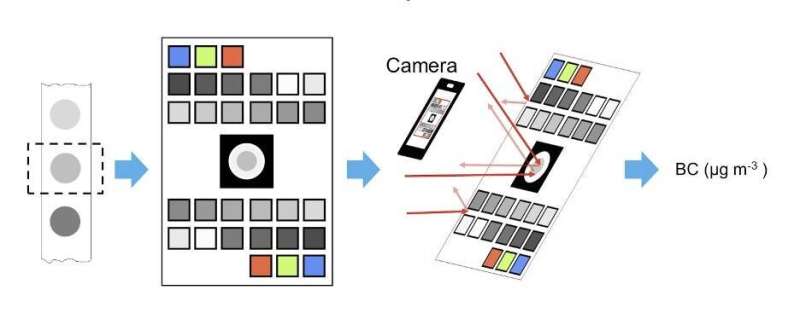This article has been reviewed according to Science X's editorial process and policies. Editors have highlighted the following attributes while ensuring the content's credibility:
fact-checked
trusted source
proofread
Democratizing air quality data at nearly no cost

Due to the high cost of air quality monitors, many countries don't have the tools in place to regularly monitor pollutants. Without routine measurements, policymakers cannot make evidence-based policy decisions to reduce fine particulate matter (PM2.5) exposure and improve human health.
To combat this problem, Albert Presto, a research professor of mechanical engineering, has identified a low-cost way to quantify black carbon in PM2.5 using glass-fiber filter tapes that are already collected by select U.S. embassies around the world.
"For this project, we started with the Global South, because in Africa the need for air quality data is the greatest," Presto said.
The team collected tapes from U.S. embassies in Côte d'Ivoire, Ghana, and Ethiopia and compared their particulate matter to that collected from a site in Pittsburgh. Their paper is posted to the preprint server ChemRxiv.
To test air quality, the researchers used a cell phone camera to photograph the filter spots on the tape on top of a custom-designed reference card. By applying an image processing algorithm to each photo, they could extract the red scale value of the photo.
This value allows them to identify the air's black carbon concentration during the hour of the day that the filter was collected.
Using this method, researchers can get a better understanding of pollutant sources. Black carbon is considered a short-term climate forcer because of the way it absorbs light and consequently warms the atmosphere. For example, if deposited on a glacier, the glacier will melt faster.
The study's findings underlined the need for more air quality monitoring in developing countries. The black carbon PM2.5 levels in the sub-Saharan African countries were as much as four times higher than those collected in Pittsburgh.
"Our process is a new way to think about low-cost analysis," Presto said. "Because the tapes are already being collected, the marginal cost for our analysis is near zero. This method can democratize air quality data because there are plenty of groups that can collect tapes from other embassies and do their own analysis for practically no cost."
Presto is eager to work with more embassies and explore what else his team can learn from the tapes. They are currently exploring a new way to extract the filters in a solvent to uncover exactly what else the PM2.5 is composed of throughout the day.
"There's growing work in monitoring air quality from outer space, but to do that we need data collected on the ground to validate the findings," he said. "Using this method, we can likely grow the number of locations where we can compare the satellite's measurement to data on the ground. We can also make more data available to countries around the world."
More information: Abhishek Anand et al, Low-Cost Hourly Ambient Black Carbon Measurements at Multiple Cities in Africa, ChemRxiv (2024). DOI: 10.26434/chemrxiv-2024-6srm4
Provided by Carnegie Mellon University




















